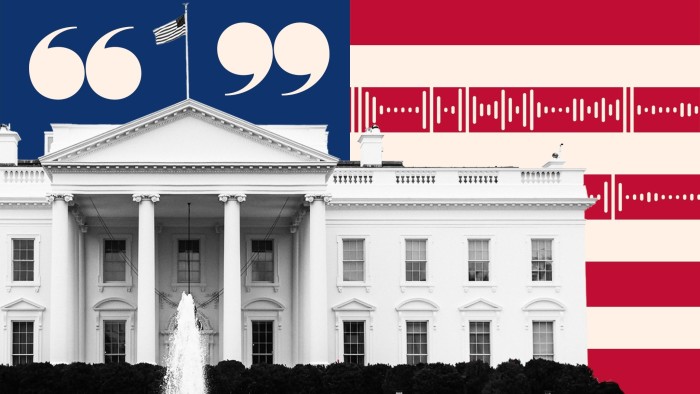Support for Joe Biden’s economic policies wanes amid inflation fears, FT poll finds

The stories that matter on money and politics in the race for the White House
Joe Biden’s re-election prospects are being dogged by persistent fears over inflation, with 80 per cent of voters saying high prices are one of their biggest financial challenges, according to a new poll for the Financial Times.
The findings, contained in the latest FT-Michigan Ross poll, come amid signs in recent months that inflation is rising again despite falling steadily last year. They reverse recent gains the US president had made among the electorate about his handling of the US economy.
The survey found voters are growing less supportive of the president’s economic policies, with 58 per cent of voters disapproving of his handling of the economy, up from 55 per cent last month — 40 per cent approved. Only 28 per cent of voters said Biden had helped the economy — a drop of four points compared to last month.
The latest consumer price index numbers next week will give fresh clues on the direction of prices. A key index of US consumer sentiment from the University of Michigan on Friday fell to its lowest level since November on worsening inflation expectations.
The poll results, which come less than six months before November’s presidential election, suggest voters are still blaming Biden for high consumer prices such as those for petrol and food, without giving him credit for a booming economy and strong jobs market.
The most recent federal data showed the personal consumption expenditures index rose to 2.7 per cent in the year to March, compared to 2.5 per cent the month before — a level of inflation above the Federal Reserve’s 2 per cent target.
That has cooled some hopes for significant rate cuts later this year, leaving mortgage and other borrowing costs elevated.
Voters consistently rank the economy as their top issue heading into November’s election, when Biden will face his predecessor Donald Trump at the ballot box.
Aside from anxiety about inflation, the poll also found 49 per cent of voters are concerned about income levels, up from 45 per cent, and just under a third — 32 per cent — are worried about housing costs, compared to 27 per cent in April.
In another worrying sign for the White House, the monthly FT-Michigan Ross survey has consistently found voters trust Trump more than Biden when it comes to handling the economy.
The May survey found 43 per cent of voters preferred Trump, up from 41 per cent last month, compared to 35 per cent who backed Biden, with 16 per cent of voters saying they trusted neither.
The survey showed voters were sharply divided over which candidate best represents the interests of blue-collar workers — a constituency Trump and Biden are aggressively courting as the campaign heats up.
Have your say

Joe Biden vs Donald Trump: tell us how the 2024 US election will affect you
Forty per cent of registered voters said Biden did a better job of representing the interests of blue-collar workers — the same number who favoured Trump.
However, the poll also showed a significant split depending on voters’ level of education. Fifty-two 52 per cent of university graduates said Biden better represented blue-collar interests, compared to just a third of non-college graduates.
The poll underscores Biden’s challenges as he seeks to win over working-class Americans. Trump defeated Hillary Clinton in 2016 in part by winning over white, blue-collar workers and shoring up support from voters without a university degree.
The survey also found Trump is widely seen as representing the interests of Wall Street and big corporations, while Biden is viewed more favourably by labour unions — another voting bloc targeted by the candidates in recent months.
The FT-Michigan Ross poll was conducted online by Democratic strategists Global Strategy Group and Republican polling firm North Star Opinion Research between May 2 and May 6. It reflects the opinions of 1,003 registered voters nationwide, and has a margin of error of plus or minus 3.1 percentage points.



Comments